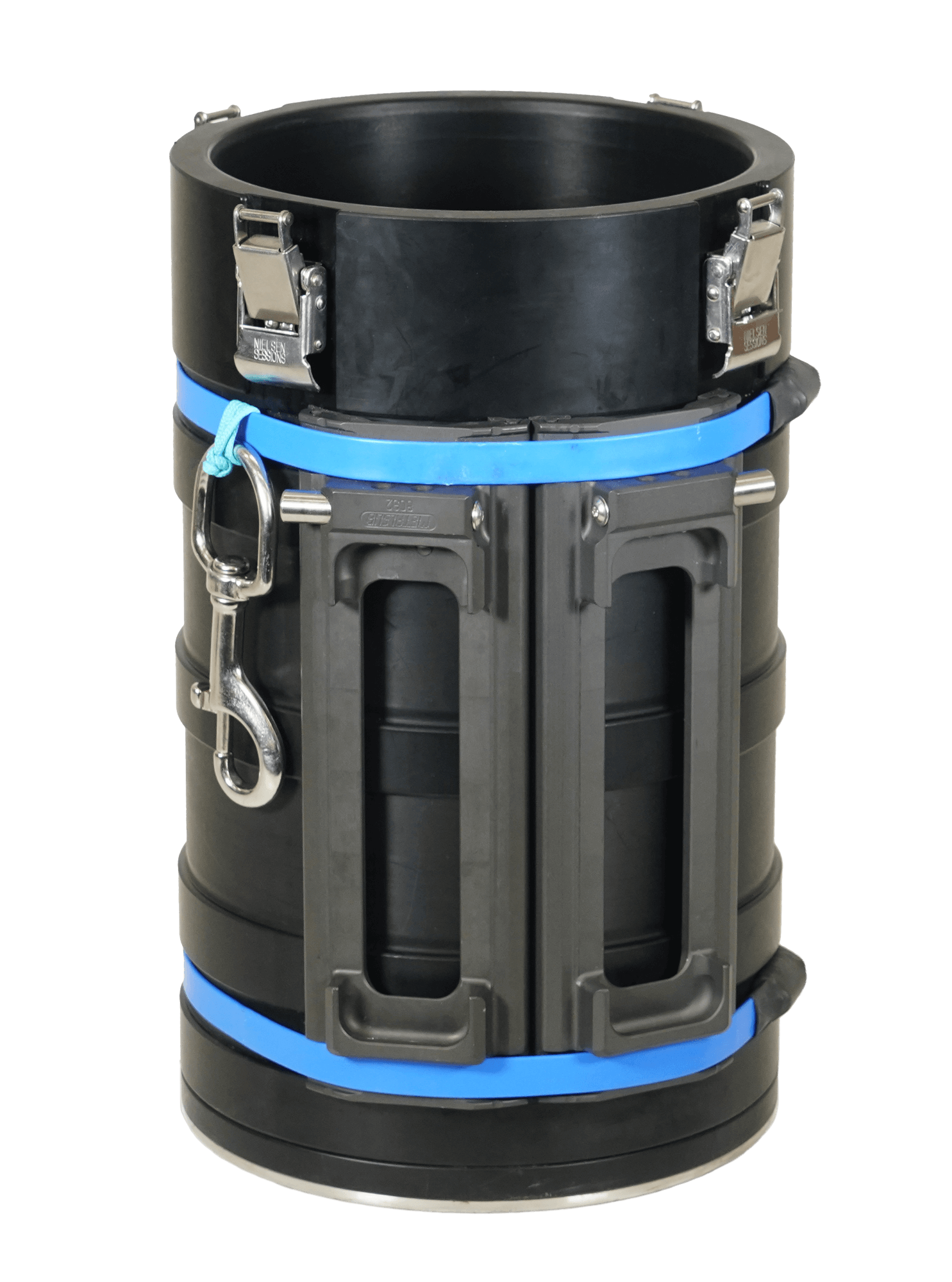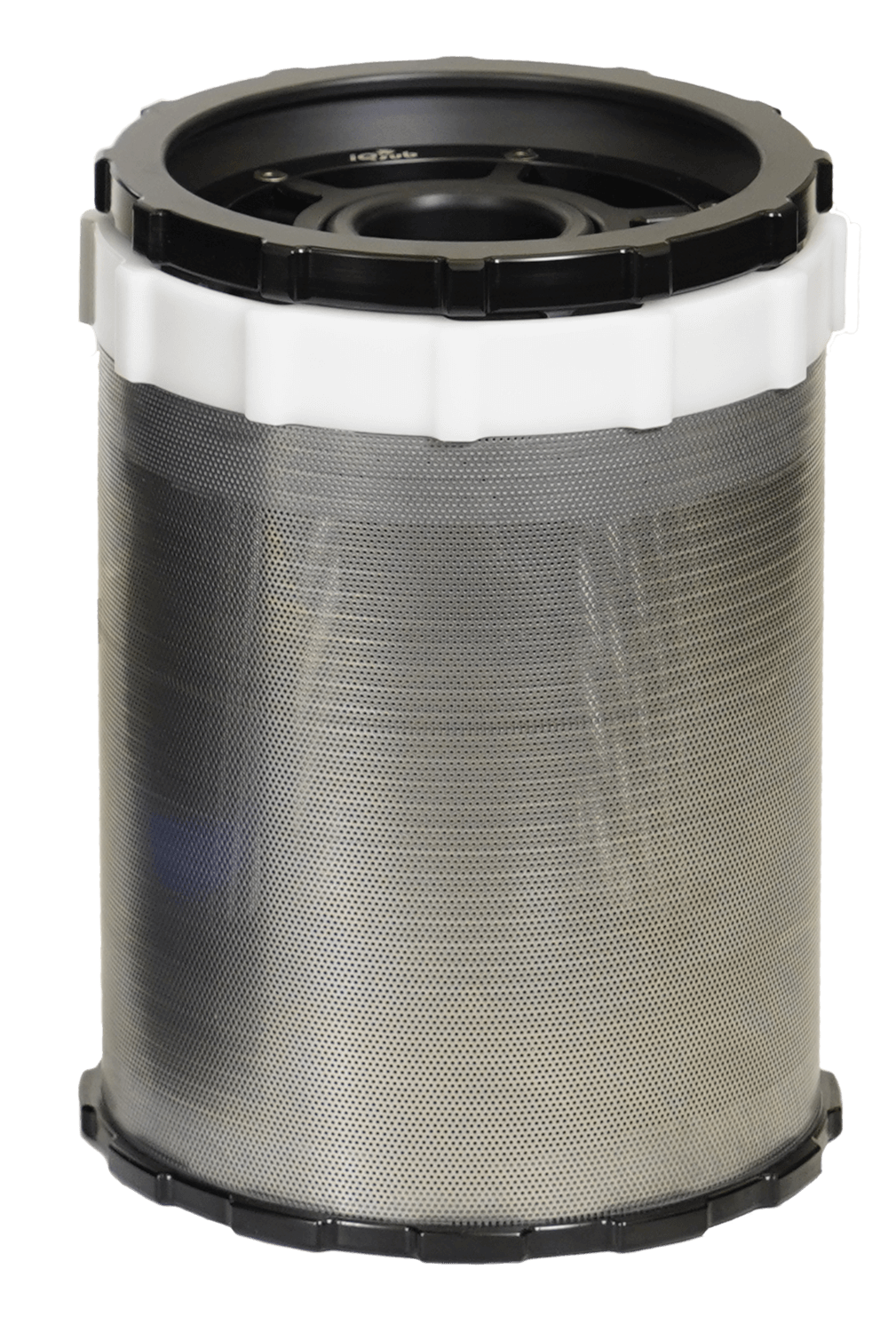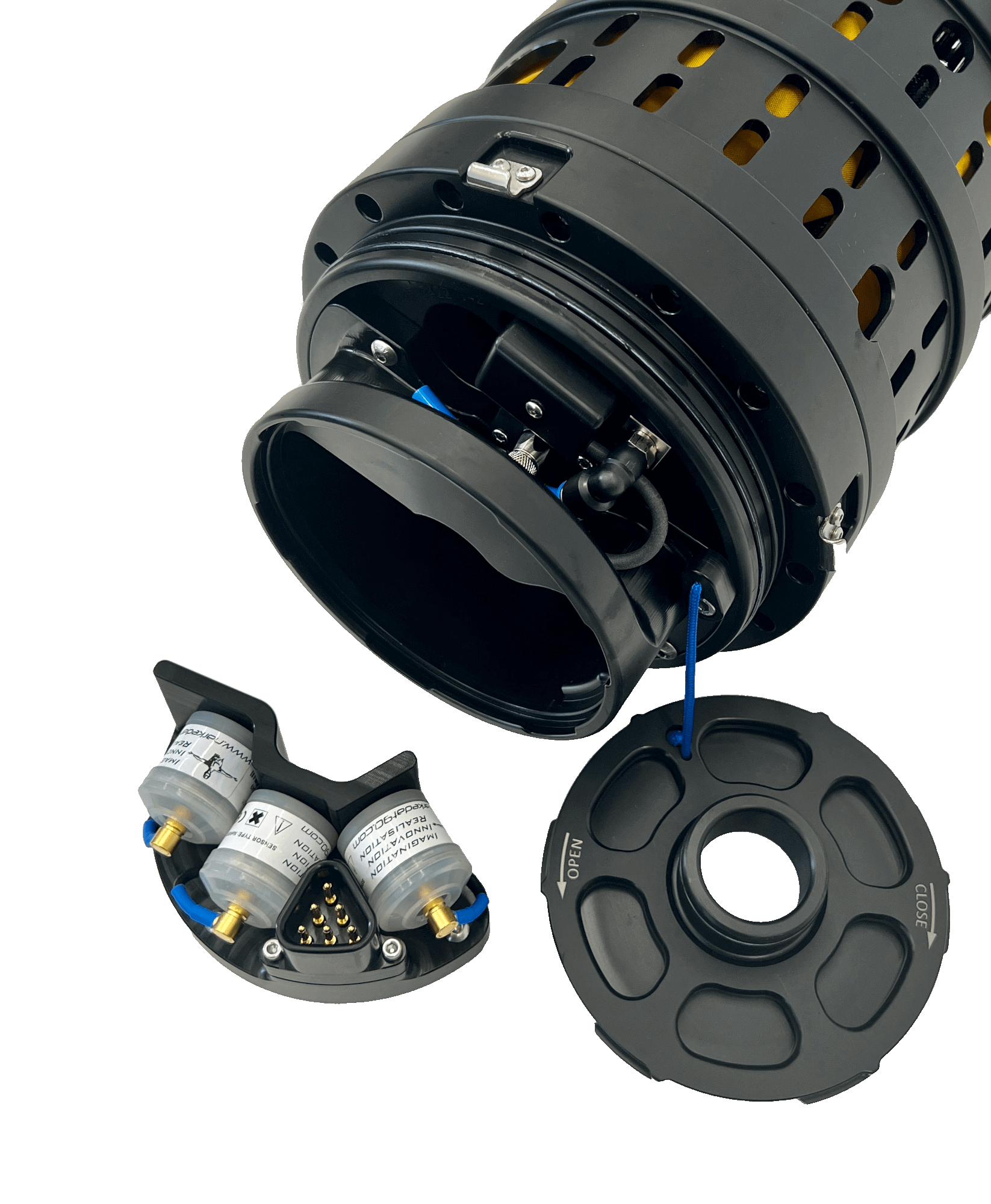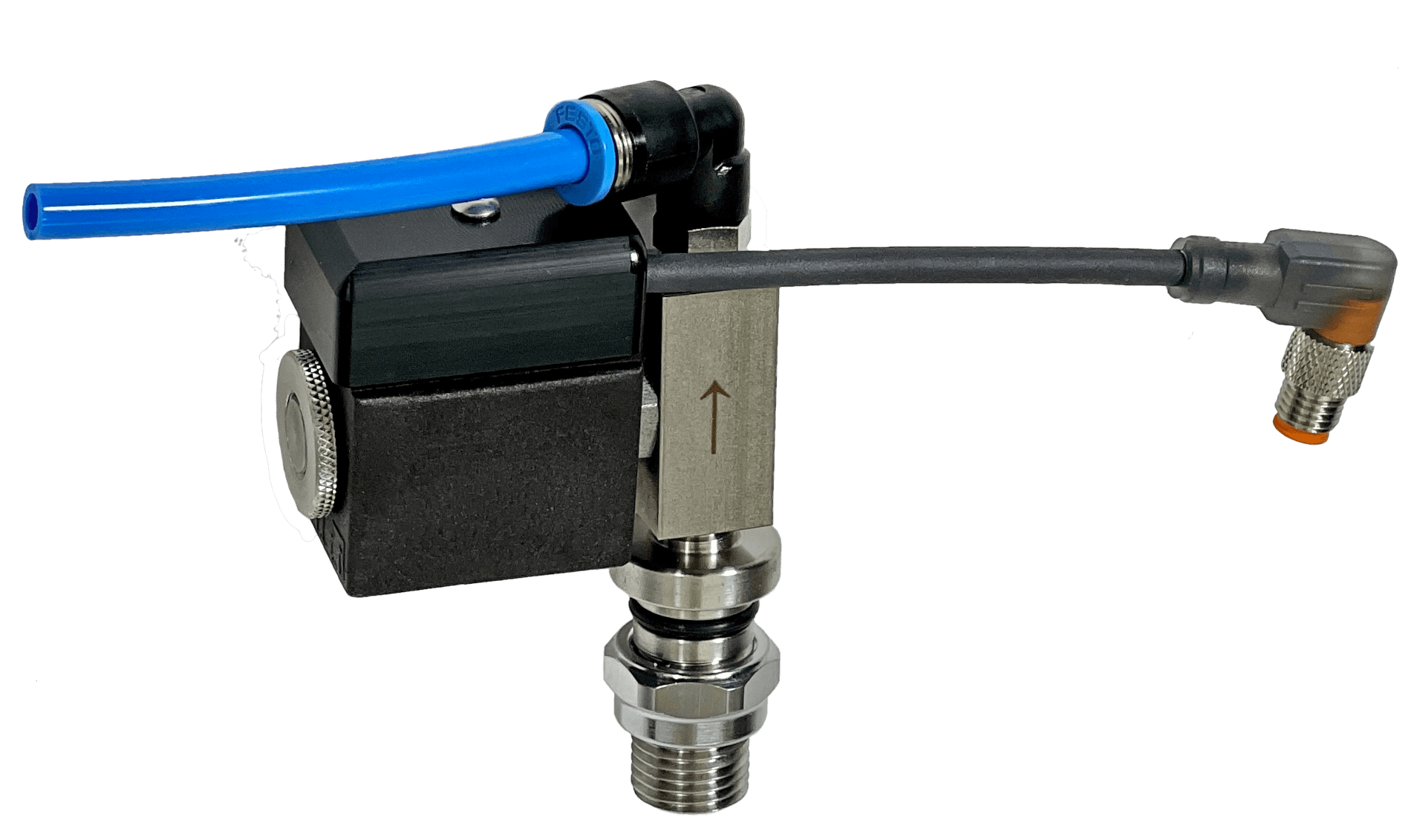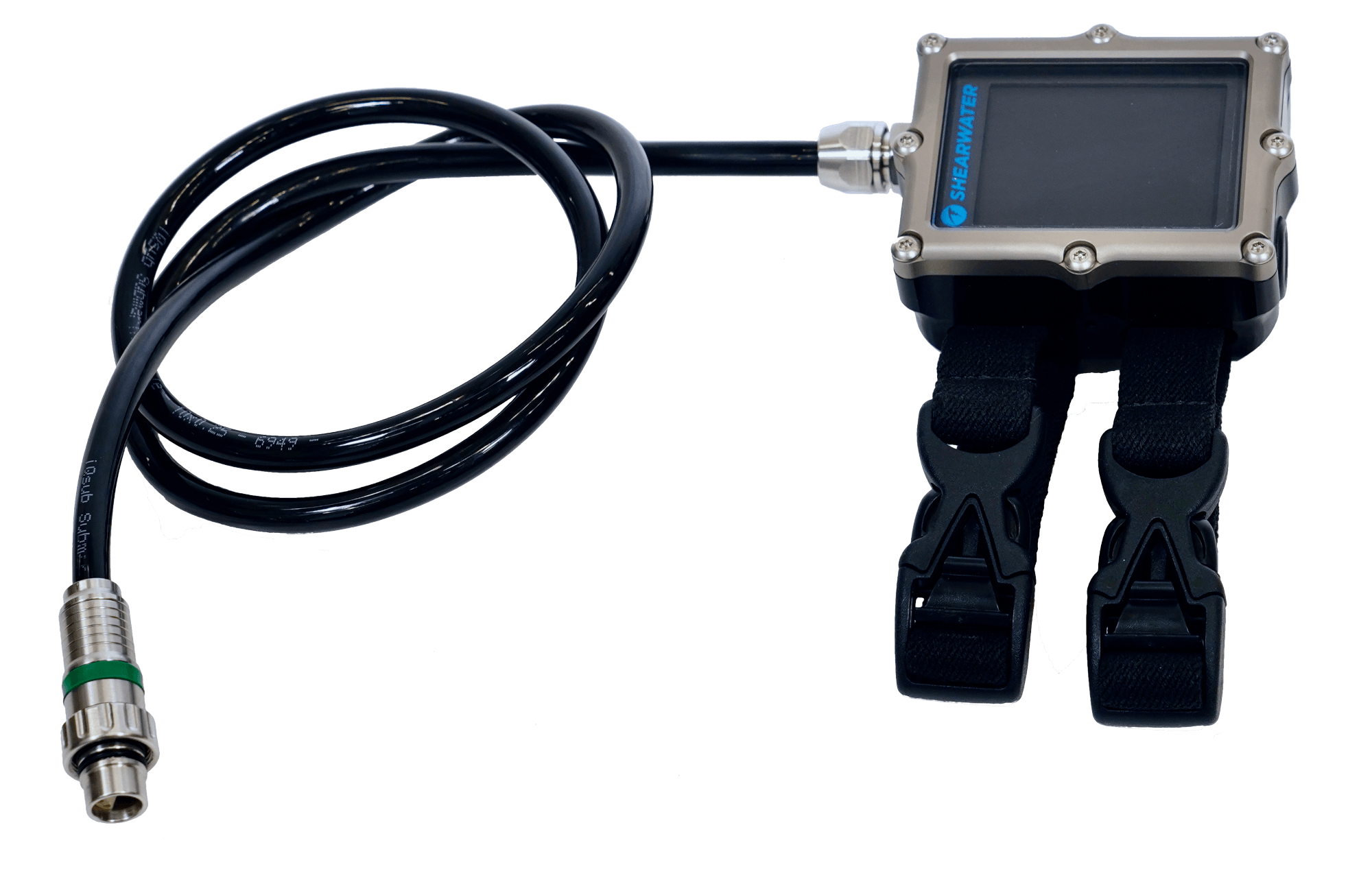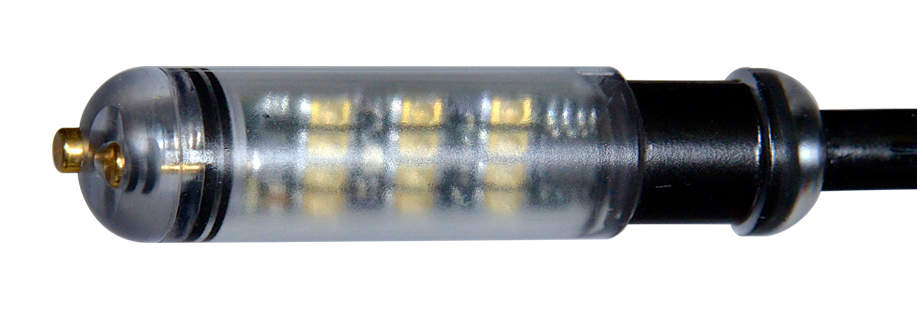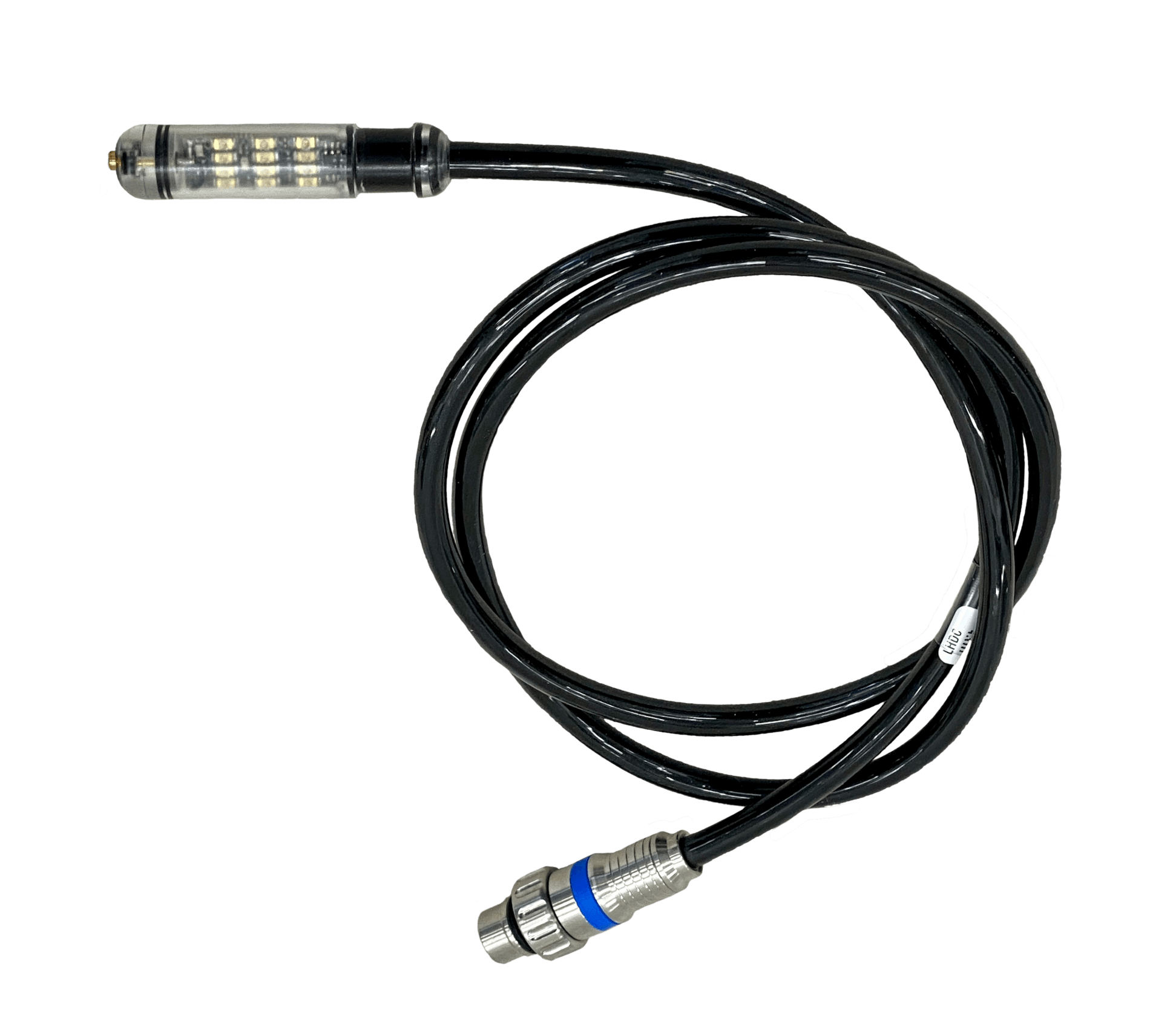Main CCR Body
consist of the robust Scrubber Canister and CCR Head, Upper Canister and Top Head, all
made of Black Delrin.
The Scrubber Canister is made of durable Delrin tube and has
a mounted bottom with a small water trap.
The bottom has a lower protective ring made of stainless steels,
which can be replaced if damaged.
The Scrubber Canister can be
equipped with one or two Quick
Release Fasteners for easy
attaching and replacing on-board
cylinders, if used.
Quick Release Fasteners provide very
easy and secure attaching of the cylinders
to the canister.
Radial Scrubber
FLEX2 CCR unit is standardly equipped with the radial scrubber
placed in the Scrubber Canister.
The Radial Scrubber (H=212mm)
has capacity of 2,5 kg / 5,5 lb of soda lime with minimal
operating time of up to 6 hours even in extreme conditions
such as cold water (4°C) and depths over 100m.
The Scrubber consist of the finely perforated concentrical tubes
made of stainless steel with the
robust bottom and top lid made of
Delrin. The white top ring reinforces
and protects the outer perforated tube.
The Top lid is equipped with an
easy to use bayonet lock and has a
self-packing feature – the spring
loaded plate ensuring sustained
compression of the soda lime to
protect against gas channeling (bypassing the soda lime).
The top lid has integrated radial handle for easy and safe removal
of the scrubber from the Canister.
CCR Head & electronics
The CCR head is the heart of the FLEX2,
which contains the control electronics, the
solenoid valve for controlled dosing of
oxygen, the removable Cartridge carrying
three oxygen sensors, two replaceable Li-
Ion batteries 18500, watertight connectors
for connection of external computers as
well as connectors with unique Click-Lock
bayonets for easy and fast connecting of
the Counterlungs.
The Control electronics
(Shearwater SOLO board) is built in the
hermetic compartment inside the head.
The SOLO board uses ppO2 readings from
three O2 sensors to autonomously
maintain the ppO2 in the breathing loop in
accordance with the current chosen
setpoint.
Modular design compartmentalizes critical functions for redundancy. The Solenoid and Oxygen
electronics (on the SOLO board) can measure and inject oxygen independently of the Primary
Controller handset even in case that the handset or its cable is unplugged or damaged, while the
SOLO board continues to control loop PPO2 until the diver is surfacing.
The control electronics uses the DiveCAN®, a digital communication standard developed by
Shearwater Research Inc. specifically for rebreathers for robust error-checked communications,
when a message is either received correctly or it isn’t received at all. The DiveCAN® is easily
upgradable and expandable.
PPO2 reading output from all three oxygen sensors are electronically separated one from another
as well as the PPO2 reading outputs to the Primary Controller Bus and the Secondary Monitoring
Bus are electronically separated one from another.
The Secondary Monitoring Bus is independent on the Primary Controller Bus and provides backup
PPO2 monitoring in the event of a failure on the Primary Controller.
A fault or short circuit on any sensor or one connected device, it does not affect the remaining
ppO2 readings on the working device.
The Primary Controller handset, the Head-Up Display or NERD2 are connected via the watertight
connectors rated up to 300m depth. The connectors allow flexible connection of the controller
and monitoring devices as well as easy disconnection of the devices for travel, upgrades and repair.
The watertight connectors are color coded this way:
GREEN DiveCAN Controller Bus.
BLUE / RED DiveCAN and Analog Monitoring Bus.
Three Oxygen sensors are placed in the
easily removable sensor cartridge making it
easy to dry, check or replace the sensors. The
sensor cartridge is connected to the head
electronics via the robust 6-pin connector
with gold plated banana pins.
The cartridge is equipped with the wire
handle to easily pull the cartridge out.
The covering lid is closed and secured by a
bayonet locking ring.
The Solenoid valve has a Stainless steel AISI 316
body and operates up to 17 bar (above the ambient
pressure), therefore no low-pressure adjustment on
the 1st stage regulator is needed.
The solenoid is connected to the UNF 9/16” fitting
with built-in O2-filter.
Two independent, easily replaceable, rechargable Li-Ion 18500 batteries
provide power supply of the control electronics board.
They are located in two separate compartments on the
sides of the head and are completely separated from
the breathing loop.
Battery #1 supplies the
Solenoid,
Battery #2 supplies the
Head-Up Display and
ppO2 reading output for
NERD2, if used.
The batteries are easy accessible via the battery caps on the CCR head.
The CCR head is attached to the Upper Canister and is mounted and locked to the Scrubber
Canister by 4 safety stainless steel latches.
To remove the head from the canister, just unlock the latches and pull the CCR head up.
Primary Controller Handset
is the Shearwater DiveCAN Petrel 3 Controller, specifically designed for the XCCR and FLEX2.
The Primary Controller Handset is connected to the control electronics in the CCR head via a robust,
durable and very flexible cable with the X-connector, made of AISI 316L rated up to 300m depth
and marked with a GREEN ring.
Primary Controller Feature List
– Two PPO2 set-points, which can be set between 0.5 and 1.5
– Automatic PPO2 set-point switching (configurable)
– Depth, time, 3x ppO2 and deco data display
– Strong Vibration alert system
– Up to 4 pressure transmitters for gas pressure monitoring
– Bühlmann decompression model with gradient factors
conservatism – Optional VPM-B decompression model
– 5 CC and 5 OC gases
– Gases can be changed and added during a dive
– CNS tracking
– Any combination of oxygen, nitrogen, and helium (Air, Nitrox,
Trimix) – Open and closed circuit, switchable during a dive
– No lockout from violating deco stops
– Metric and Imperial units
– Automatic turn off on the surface (after 15 minutes)
– Tilt compensated digital compass
– Dive Planner
– 1000 hour dive log memory
– Log downloads and firmware upgrades using Bluetooth
– Flexible user replaceable “AA” battery of almost types
Head-Up Display
The Head-Up Display (HUD) is compact Shearwater DiveCAN HUD with PPO2 monitoring on three
O2 sensors.
The main feature of the Head-Up Display (the HUD) is to show the current status of ppO2 in the
breathing loop as well as ppO2 alarms to the diver.
The HUD has wet contacts for automatic turning on when entering water.
The HUD is power supplied by the battery #2 in the CCR head.
The HUD is connected to the control electronics in the
CCR head via a robust, durable and very flexible cable
with the X-connector, made of AISI 316L rated up to
300m depth and marked with a BLUE ring.
The HUD is placed in a two way adjustable holder
located on the SM BOV Neo or SM DSV.
NERD 2
The FLEX2 CCR can optionally be fitted with a NERD 2 – the compact near to eye Shearwater
DiveCAN Computer in place of the HUD. NERD 2 acts as a secondary computer with PPO2
monitoring on three O2 sensors and Trimix decompression.
The NERD 2 has wet contacts for automatic turning on when entering water.
The NERD 2 is power supplied by its own Integrated rechargeable battery for up to 15 h operation
time.
The NERD 2 is placed in a three way adjustable holder located at the SM BOV Neo or SM DSV.
The NERD is connected to the CCR head control electronics via a robust, durable and very flexible
cable with the X-connector, made of AISI 316L rated up to 300m depth and marked with a BLUE
ring.
NERD 2 Feature List
– Depth, time, 3x ppO2 and deco data display
– Bühlmann decompression model with gradient
factors conservatism – Optional VPM-B
decompression model
– 5 CC and 5 OC gases
– Gases can be changed and added during a dive
– CNS tracking
– No lockout from violating deco stops
– Any combination of oxygen, nitrogen, and
helium (Air, Nitrox, Trimix) –
Open and closed circuit,
switchable during a dive
– Automatic turn off on the surface (after 15 minutes)
– Tilt compensated digital compass
– Dive Planner
– 1000 hour dive log memory
– Log downloads and firmware upgrades using
Bluetooth.
Learn more about FLEX2 CCR:

